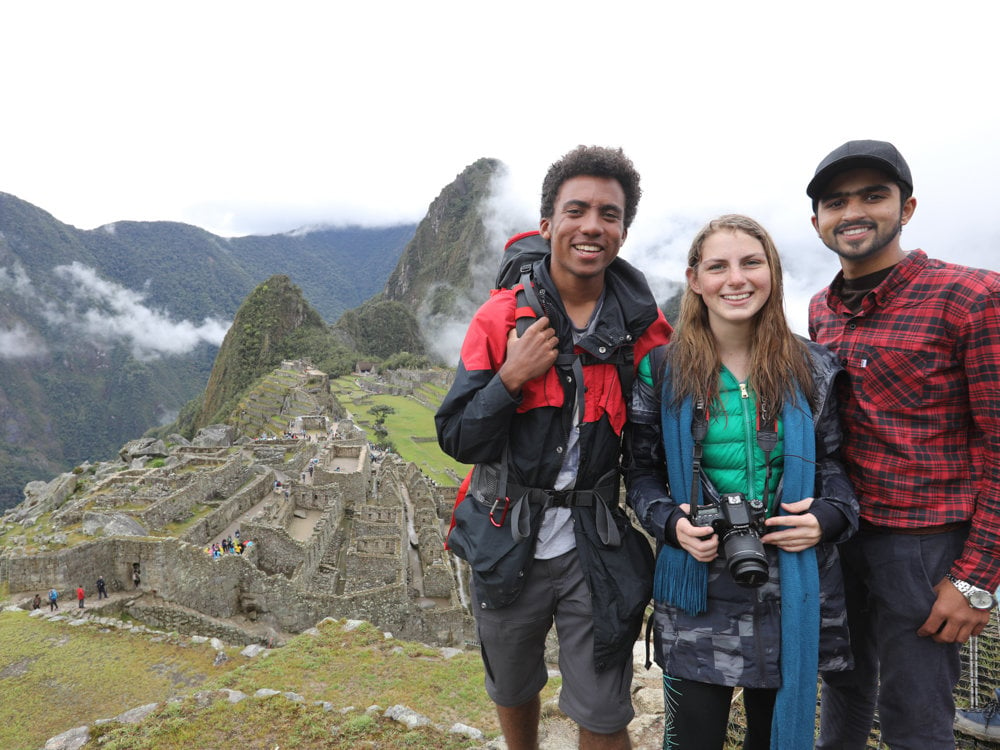15 Pro Tips for Doing Your Gap Year on a Budget
Follow these 15 tips and tricks to make the most of your gap year on a budget!

While it would be wonderful to freely travel the world with a limitless wallet, you can still have an amazing gap year on a budget! Your gap year is a period of both personal and professional development, and there’s no reason to write the possibility of it off due to a tight budget.
Whether you want to visit the tropics of Thailand, study in tech-savvy South Korea, or bask in Australia's biodiversity and thriving coastal life, there are many ways you can stretch your budget abroad. Take heed of these expert budget tips and get ready for the perfect gap year regardless of your financial circumstance!
Read more: How to Take a Gap Year for Free or Cheap
Gap Year Crash Course: Scholarships & Funding
Learn even more about funding opportunities for your gap time with this recorded webinar from the 2021 USA Gap Year Fairs series!
1. Pick a budget-friendly country
Firstly, you’ll need to decide on a country (or countries) which will allow you to make the most of your budget. You don’t need to filter the cost of living index by “lowest”, as many popular destinations have lower living costs relative to western countries. However, it’s a good idea to research which countries and cities can maximize your gap year on a budget.
Countries in Southeast Asia such as Thailand, Vietnam, and Laos or European countries such as Portugal, Poland or Hungary, for example, are low cost-of-living options which will allow you to be frugal without feeling like you’re economizing.
However, this doesn’t rule out higher cost of living destinations such as Australia, Canada, or New Zealand to facilitate your gap year. These destinations are not only attractive gap year options but offer working holiday visas which are an effective way for you to travel on a budget. Which leads us to our next pro tip…
2. Volunteer, teach, or do a work exchanges

There are many ways that you can cut costs or even earn a salary on your gap year abroad. Work exchanges are popular ways for travelers to earn an income or at least negate high costs such as accommodation. Travelers can exchange work for free accommodation, meals, transportation, or even a salary. Working front desk at a hostel, applying to be an Au Pair, or lending a hand on a farm can often provide work in turn for benefits, and it’s also a great way to meet like-minded travelers!
Volunteering abroad is another fantastic way to minimize costs while contributing to community oriented goals. Positions are often flexible, allowing you to commit to as little as a week or for as long as you want.
Teaching English abroad is another rewarding way to immerse yourself culturally and become an active member of the community, all while gaining a salary for your admirable work. Positions vary, with summer camps, homestays, local schools, being feasible options. At the end of your stay, you can decide to extend your experience or use the money you’ve saved to travel to surrounding countries!
Some gappers find themselves teaching English abroad as their “gap year” - only to find and pursue it as a career that they really enjoy! Take it from me - my postgraduate “gap year” went from a semester of teaching English in Vietnam to four years (and still counting) of teaching abroad!
3. Time your traveling strategically
If you’re flexible in your travel dates, you can save money by not traveling during the high season or on public holidays. During public holidays and the high season there are a higher number of travelers, driving demand and therefore the price of airfares, accommodation, and more.
When it comes to booking flights, try to book a midweek flight rather than on the weekend. With people working during the week, this creates a higher demand (and price) for weekend flights.
Another way you can minimize expenditure while in-country is by booking an overnight bus or train to get from one place to another. This means that you can avoid paying for an extra night of accommodation, and you’ll also have an extra day of sightseeing uninterrupted from traveling!
4. Pay attention to exchange rates
Pay attention and compare exchange rates at different places in advance to your departure. You may find currency exchange services that offer good exchange rates near your home, or you may find that it is better to wait until you’re in-country.
Exchanging money at the airport may be more convenient, but likely to be more expensive than doing so at a shop in town. Additionally, it may be a good idea to exchange some money before departure. This would allow you enough money to buy food or transportation from the airport. Once you’re in the town or city of your destination, you may find cheaper alternatives there.
5. Plan for visas, vaccinations & passport fees
When planning your gap year, don’t just consider what you’ll spend on food and activities. Make sure that you’re clued up on whether you need a visa, vaccinations, or other and how much they will cost. Some airports may only accept dollars for on-arrival visas, for example, so be sure to research the entry requirements.
Ensure that you have the necessary vaccinations for your upcoming trips. Most vaccines are optional, however, you may be willing to pay for additional security and reassurance that you are less likely to fall ill. Depending on your home country’s health service, they may offer some vaccinations for free. You may need to enquire in advance to ensure that they have these vaccinations available before your departure.
Additionally, make sure that your passport is valid or that you apply for one in advance before your trip. Otherwise, you may have to pay for expedited passport services which can be costly.
Read more: 10 Useful International Travel Trips for First-Time Travelers
6. Cut out the middleman

Choosing to go with a program for your gap year can be blissful - as they’ll help you organize your visa, flights, accommodation, meals, activities and cultural excursions, and more! All you’ll need to do is show up and enjoy your travels!
However, going with a gap year program can sometimes be costly, and if you’re on a strict budget, it may be a good idea to cut out the middleman. By doing a little bit more research yourself, this will provide you with more room for flexibility for you and your wallet.
Read more: Most Affordable Gap Year Programs in 2024
7. Avoid carrying too much cash
This is of course dependent on whether the destination operates in a cash based society. If it’s not, carrying cash is an easy way to lose track of your budget. After a few purchases, you may lose track of how much you have spent and how much of your daily or weekly budget you have left. What’s the alternative to this? This brings us to our next point(s)...
8. Use an international card or a currency card
You can minimize what you carry and spend by loading cash onto an international or currency card through your bank before you leave and spend it while abroad.
By doing so, you’ll get a fixed exchange rate - so if you buy it on a day where the exchange rate is good, you keep it at that rate until all the money is spent. The perks: they do not have overdraft fees and if lost, can be replaced with a new card without losing your balance.
A travel credit card that doesn’t have international fees may also allow you access to perks such as reward points, discounted rates for hotels, TSA PreCheck, and more. Additionally, international bank cards will also mean that you pay less when it comes to ATM fees.
9. Use a budgeting app
In addition to using a currency card or international card, you can use a budgeting app to keep track of expenses from the first day to the last. By having a money tracking app like Spendee or NomadWallet, for example, you will be able to keep tabs on your expenditure from the first day to the last.
You may have had a lavish day or a crazy night out which went over your daily budget, or, you may have been more frugal than anticipated which means you’ve more room to spend money on your remaining travels - without a budgeting app, you wouldn’t know!
If you’re traveling in a group, SplitWise is one of the best ways to organize expenditure within a small group of travelers. SplitWise allows you to keep tabs on who has spent how much and on what particular items, and it will greatly reduce the unnecessary headaches concerning who owes who money.
Read more: How to Plan Group Trips on a Budget: Split Costs and Save Money
10. Be flexible in the length of your gap year
Be flexible in the length of your gap year. Taking a “gap year” doesn’t mean the entire year has to be spent away, or that it even has to last a year. It can be much shorter, or much longer. Or, you can do it in several stages.
If you have a small budget, try a series of shorter international tours and trips or volunteer positions during your year off instead. These can span for a few weeks to a few months, with breaks in between. If an “all or nothing” mentality will harm your experience, there’s no reason not to plan strategically and spread your gap year across multiple stages.
11. Spend time with people local to the area

A big part of going abroad is spending time interacting with people of other backgrounds. By immersing yourself within the local community, not only are you enriching your experience but you can gain some insight on the lay of the land.
The local population can not only provide a welcoming experience but they can share their knowledge about some of the tips and tricks on where to go and what to do when it comes to saving money. This includes finding the hidden gems when it comes to eateries and thrifty markets, the best free activities, and more! This is often a huge byproduct of being a volunteer, doing work exchanges, or teaching abroad!
12. Buy a local SIM card
The fees from international calls and texts can be extortionate. If you don’t already have international roaming, and you want to avoid these fees while still making use of your phone frequently, consider getting a local SIM card. In most cases, getting a tourist SIM card will work out far cheaper than using your home SIM card for international contact.
If you can, wait until you’re out of the airport to get your local SIM card, as booths selling SIM cards in the airport often charge for more. Otherwise, consider downloading some apps which can help maintain your connectivity with friends and family members while you’re abroad!
Read more: Top Apps to Stay in Touch With Loved Ones While Overseas
13. Prioritize what you do
Don’t unnecessarily spend money and waste time trying to squeeze everything in just because you feel like that you should. While there are certainly unique things to do in each location like visiting iconic landmarks, don’t feel compelled to tick each item of the “things to do” list. This experience is about what you want to do, not what other tourists typically do.
Additionally, whether you’re country hopping or staying put in one country, don’t feel that you have to cover every inch of the country that you’re in. Some countries are huge - and it may be better to thoroughly experience one region rather than barely scratch the service of many. That way, not only will you save money by spending less time traveling, you’ll immerse yourself deeper into the cultural characteristics of each place you visit.
14. Make use of gap year scholarships and opportunities

If you’re a student, have you ever considered applying for gap year scholarships to make the most of your experience? Thankfully, international organizations offer programs and gap year scholarships because they recognize both the personal and professional benefits of taking time off to travel and see the world.
Gap year scholarships and grant providers want to increase accessibility to young people who want to travel the world, study abroad, volunteer, learn languages, and more, but don’t necessarily have the financial security to do so.
While only in a perfect world will everyone who applies be granted a gap year scholarship, it can’t hurt to try. As they say, “if you don’t buy a ticket, you won’t win the raffle.”
Each year, there are many gap year scholarships and grants that you can apply for on Go Overseas. And to maximize your chances of winning, here are 11 secrets to winning study abroad scholarships!
If you’re based in the US, you can look out for USA gap years fair which are free public events held in cities all over the country. A gap year fair can help you understand more about your options and allow you to connect with gap year organizations, educators, experts, and alumni.
15. Find free accommodation
Alongside flight expenses, paying for accommodation takes up the largest chunks of your budget. However, there are many ways that you can mitigate these issues.
One way you can find free accommodation is by “couchsurfing”. This is more popular than you may think! Couchsurfing is a hospitality exchange app and platform where you can request to stay at someone’s home for a short amount of time while you are traveling.
Another way to benefit from free accommodation is by house sitting. Websites such as Workaway, TrustedHousesitters, The House Sitters, and more allow you to find temporarily vacant places for a short period of time and owners who need someone to look after their home.
A house sitter will typically have responsibilities such as looking after pets or plants, cleaning the house, or simply looking after their home. Or, some homeowners are happy enough to let travelers have a temporary home at their place while they travel themselves.
Take a gap year on a budget like a pro!
While some may not understand the values of a gap year from the outside, your gap year is a time of personal, spiritual, and professional development. Traveling on a budget will make you resourceful, creative, culturally adaptable, and much more. A gap year is great for undergraduates, postgraduates, and those who want a career break. Regardless of your financial situation, there are many tips you can use in order to have the perfect gap year abroad.



